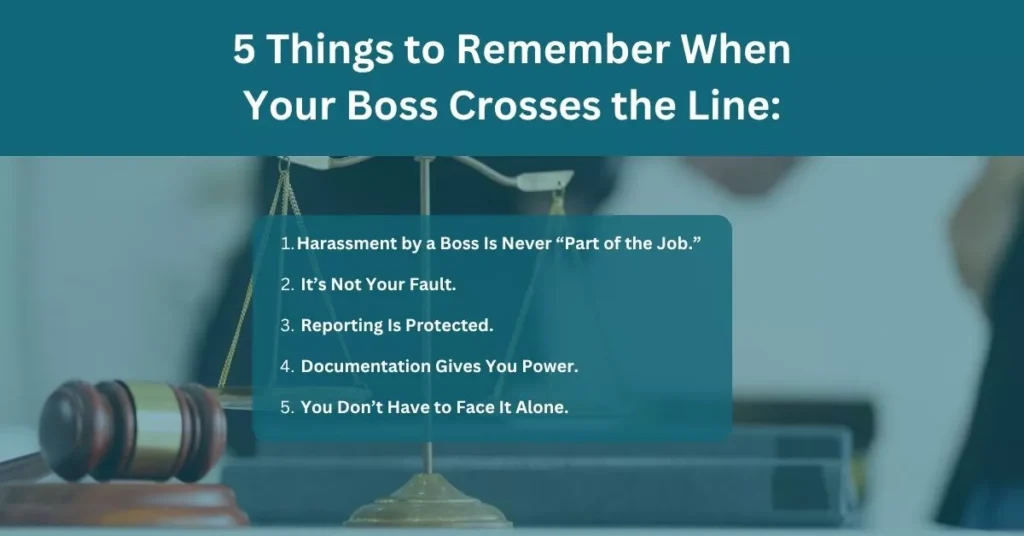When the person who signs your paycheck is also the one crossing the line, it can feel impossible to know what to do. Harassment by a boss is not only uncomfortable, it’s also a violation of your rights and an abuse of power.
Under both Oregon and federal law, sexual harassment by a supervisor is illegal. These cases are especially serious because of the power imbalance between you and your boss and the potential fear of retaliation.
If this is happening to you, know that you’re not alone. Meyer Employment Lawhelps Oregon employees navigate workplace harassment and hold employers accountable. This guide walks you through six key stepsyou can take right now to protect yourself, your job, and your peace of mind.
Also read:
Oregon Employment Harassment
Oregon Sexual Harassment: Know Your Rights in the Workplace
5 Types of Discrimination in the Workplace

Understand What Qualifies as Sexual Harassment
Before taking action, it helps to understand what legally counts as harassment. Under ORS 659A.030and Title VII of the Civil Rights Act, sexual harassment includes any unwelcome sexual advances, comments, or behavior that affects your employment or creates a hostile work environment.
Common examples include:
- Unwanted touching or physical closeness.
- Suggestive jokes or comments about your appearance.
- Repeated texts or messages with sexual overtones.
- Requests for sexual favors in exchange for job benefits.
- Threats, retaliation, or intimidation after rejection.
When the harasser is your boss, the situation is even more serious. Oregon law often holds employers strictly liablefor harassment committed by supervisors.
Recognizing that your boss’s conduct crosses the legal line is the first step toward taking back control.
Step 1: Start Documenting Everything
If your boss is harassing you, documentation is your best defense. Write down every incident — even those that seem small or isolated.
Include details such as:
- Date, time, and place.
- What was said or done.
- Who witnessed it.
- Any texts, emails, or messages you received.
Keep copies of all evidence somewhere private and secure, ideally outside your workplace network. Do not delete messages or modify screenshots.
A discrimination lawyer in Oregoncan help ensure your evidence is preserved correctly and remains admissible in court or before state agencies.
A solid record transforms your word into proof and gives your attorney the tools to fight for you effectively.
Step 2: Report the Harassment
If it feels safe, follow your employer’s internal reporting process — usually outlined in your employee handbook or company policy.
When your boss is the harasser:
- Report the behavior to HR, another manager, or an owner.
- Always report in writing(email is best).
- Save copies of everything you send and receive.
You are not legally required to report internally before filing a claim, but doing so helps create a documented trail that can strengthen your case later.
Reporting harassment can be intimidating, but it’s an important act of self-protection — and Oregon law shields you from retaliation when you do.
Step 3: Watch for Retaliation
Retaliation can take many forms, and it’s illegal under ORS 659A.030(1)(f).
Examples include:
- Sudden negative performance reviews.
- Being excluded from meetings or projects.
- Schedule changes or reduced hours.
- Termination or demotion after reporting.
Keep documenting after you report. Note any change in how you’re treated and keep all communications.
If retaliation begins, notify your lawyer immediately. It can become a separate legal claimand increase your potential compensation.
Retaliation is a second wrong, and the law gives you the right to fight back.
Step 4: File a Complaint with BOLI or EEOC
If your employer ignores your report or fails to act, you can file a formal complaint with:
- Oregon Bureau of Labor and Industries (BOLI)— for violations under Oregon law.
- Equal Employment Opportunity Commission (EEOC)— for federal claims.
Deadlines matter:you typically have 300 daysfrom the harassment or retaliation to file.
Once filed, the agency may investigate, mediate, or issue a “right to sue” letter that allows your lawyer to take your case to court.
Filing a formal complaint holds your employer accountable and protects your right to pursue justice.
Step 5: Contact an Oregon Employment Lawyer
You don’t have to go through this alone. An employment law lawyer in Oregoncan help you:
- Assess whether your employer followed the law.
- File with BOLI or EEOC correctly and on time.
- Negotiate settlements or pursue litigation.
- Calculate damages for lost wages, emotional distress, and attorney fees.
Meyer Employment Lawprovides confidential consultations to Oregon employees who have been harassed by supervisors or coworkers.
Legal guidance empowers you to make informed, strategic decisions instead of emotional ones.
Step 6: Prioritize Your Safety and Mental Health
Sexual harassment is deeply personal, on top of being a legal violation. The emotional toll can be heavy, and recovery takes time.
Protect yourself by:
- Speaking with a therapist or counselor.
- Taking sick or personal leave if needed.
- Reaching out to trusted friends or support organizations.
- Reporting any continued contact or threats to HR and/or the authorities.
External resources:
- BOLI Workplace Harassment Resources
- National Sexual Harassment Hotline (1-800-656-HOPE)
Your well-being comes first, and protecting your health is part of protecting your rights.

Recap – 5 Things to Remember When Your Boss Crosses the Line:
When the person in power becomes the person causing harm, it can leave you feeling trapped. But you have rights, and you deserve to work in a safe environment.
- Harassment by a Boss Is Never “Part of the Job.”
No supervisor or manager has the right to use authority to intimidate or pressure you into tolerating inappropriate behavior. - It’s Not Your Fault.
Harassers rely on power and fear to keep victims silent. The law protects you, not them. - Reporting Is Protected.
Oregon law makes it illegal for an employer to retaliate when you report harassment. - Documentation Gives You Power.
Even one saved message or email can make the difference between doubt and proof. - You Don’t Have to Face It Alone.
An employment law lawyer in Oregoncan guide you confidentially — even before you decide to take legal action.
Did You Know?
Nearly one in three Oregon workerssay they’ve witnessed or experienced workplace harassment, according to state employment data.
Source: Oregon Bureau of Labor and Industries (BOLI)
Standing up to harassment takes courage, but the law and advocates who protect workers are on your side.
Conclusion
Harassment by a boss is one of the most difficult situations any employee can face, but you have rights and powerful protections under Oregon law.
If you’re ready to take action, or just need to understand your options, we’re here to help.
Contact Meyer Employment Lawfor a confidential consultation today. You don’t have to face this without help.
FAQs
Can I report harassment if my boss is my only supervisor?
Yes. You can report to HR, ownership, or file directly with BOLI or EEOC.
Can I get fired for speaking up?
No. Retaliation for reporting harassment is illegal.
Do I need proof to file a complaint?
Documentation helps, but your testimony alone can start an investigation.
What damages can I recover?
Compensation may include emotional distress, back pay, and sometimes punitive damages.
How long do I have to file?
Typically within 300 days of the last incident. Acting quickly strengthens your case.
How Meyer Employment Law Can Help
Meyer Employment Lawis a Portland-based firm focused on protecting Oregon workers in cases involving harassment, discrimination, retaliation, and wrongful termination.
We can:
- Review your evidence and documentation.
- File BOLI or EEOC complaints on your behalf.
- Pursue settlements or litigation.
- Ensure your employer doesn’t retaliate further.
We advocate only for employees, never employers — and we understand how to navigate the legal process with compassion and strength. Contact us now, and take the first step towards justice.



